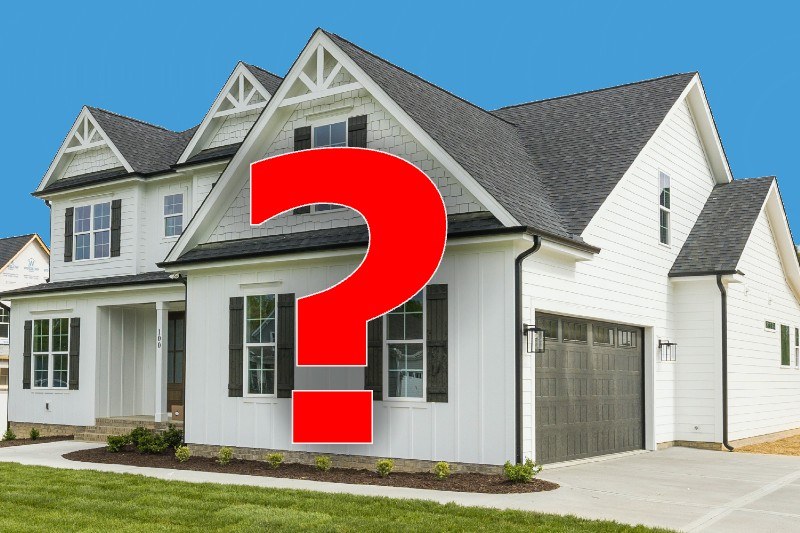Plenty of homes on sites like Zillow and Realtor right now are listed “as is.” An “as is” condition means the home seller isn’t willing to make repairs or updates to the home in order to sell it.
Sometimes the issues are minor, such as broken cabinets, dead outlets, or stains on a wall that could be scrubbed off or painted over.
Other issues can be more serious, such as broken windows, holes in the ground, and damage to the floorboards - in other words, problems that will likely require a contractor to fix.
“There are lots of reasons people sell their home as-is - life circumstances, such as divorce, where they just need to sell the house quick,” explains North Virginia-based listing agent Joy Khalil. “Maybe they don’t want to spend the money fixing up the house, they don’t have the time, maybe they’re military, have a corporate relocation or a medical emergency.”
Khalil advises thinking about whether listing your home “as is” is truly necessary.
“The phrase 'as is' has a negative connotation. Selling a home 'as is' means that you’re publicly saying that I’m not fixing anything, it’s not in good condition, so if we can avoid it, that it’s better,” she explains.
It’s always possible to list a home without this specific wording, but mention that the home inspection will be for informational purposes only (in other words, the seller won’t make repairs or give money for repairs).
How much do you lose selling a house as is?
This is the question everyone is asking, but there's no easy answer. This is because "as is" can cover a wide range of conditions. It can describe a home that needs a lot of repairs before it's move-in ready - it can also describe a typical home for sale and the sellers just need to move and close as quickly as possible.
"When you have an as-is situation, you’re not going to get as much value for your property," Khalil notes.
She points out that just because selling a home "as is" may not net the same profits a fully renovated home does, doesn't necessarily mean you should pool your money into fixing it up: "If you spend $20,000 fixing up a bathroom, don’t expect exactly $20,000 back on the sale. I always tell people, it’s best if you’re thinking of repairing things, to do it early - while you still live there - so you can enjoy it a little bit and not feel cheated."
Should You Renovate Before Selling Your Home? covers this in more detail. In essence, it's worth keeping in mind that: "Certain renovations will never raise the value of your home enough for you to break even on the cost. You need to be strategic about the home updates you make so that you meet your goal to net more money or sell your home faster without accruing more costs for yourself."
If you can take care of relatively minor fixes, though - like spending $5,000 on making sure the home is in workable condition - it can often be worth your money to fix it up.
Otherwise, you're limiting your pool of potential buyers to people willing to wait to move in, or are willing to move into a house that requires repairs - and GoBankRate says that 48% of buyers are looking for a turnkey property. And anytime you limit the buyer pool further, you limit your potential profit as well.
What are the benefits of listing as is?
If you need to sell your home quickly and don’t have the resources to fix it up, selling it “as is” is a way to get some of your equity back so that you can move on. It’s a good time to list an “as is” home because the market is incredibly competitive, and many home buyers are willing to take a larger gamble than they normally would be if it means getting a house. Investors are also more willing to take on fixer-uppers knowing that they can flip them and profit.
“In this market, people don’t care. It depends on how many repairs it needs - but even it’s a full gut, if it’s priced correctly, it should move,” notes Khalil. “In a less competitive market where there are plenty of homes to go around for buyers and they can pick and choose, most likely it’s going to be bought by a flipper.”
Listing a home "as is" gives buyers a more clear picture of the negotiation process - they know the seller won't be doing repairs.
What are the drawbacks of listing as is?
When you sell a home “as is,” you may lose the interest of some potential buyers - even if you’ve priced it fairly. Why?
- Traditional lenders won’t sign off on a mortgage if the home is uninhabitable
- Many home buyers can’t wait weeks or months to move in, so they’ll look for a home that’s more “turn-key” - AKA, ready for move-in
- Buying your home might be extra work because the buyer will likely need to receive quotes from contractors in order to determine whether your selling price is a fair one
- Just as with online dating, home buying is a very visual experience and homes in an obvious state of disrepair won't look as appealing on the screen (even if they're priced correctly)
On average (although this number shifts up and down depending on the season, the local market, and other factors) a home is on the market for 22 days and closes in 49 days. If you’re selling a home as-is, though, it could take longer than average to sell your home (due to a smaller pool of potential buyers).
“I don’t always recommend it. If you can avoid it, we have systems now where if people don’t have the money, there are loans available. You can buy a bridge loan or a renovation loan,” explains Khalil. "If you don’t have the time, that’s a different situation."
Once you know the repairs you’ll be making, you can put the house for sale at the new price based on the value once you get it fixed (while noting, of course, all the fixes you’ll be making).
What’s an alternative to selling as is?
If you’re trying to sell your home quickly, selling it “as is” isn’t always the best option - because your home could sit on the market for weeks before someone is willing to buy it, and the longer it sits, the more likely buyers are to ask for price reductions, eating into your profit.
There are many companies willing to buy homes in “as-is” conditions. These investors will then fix up the home and sell them for a profit. This is often a quicker way to access equity than going to market - however, these companies are never going to pay market value.
If time is not as big an issue, an FHA 203(k) loan is a government-backed loan that allows you to make repairs on your existing house. This can be incredibly useful for home sellers who understand the value of making repairs - but simply didn’t have enough cash to cover them.
Private lenders also have options for home sellers, where payment isn’t required until you know the home is sold. “There are companies out there that will do the work and not want payment until closing. So they’ll get the money when you close,” notes Khalil.
You can refinance your home in order to pull out some of your equity, and use that equity to make repairs and improvements. Keep in mind, though, that refinancing typically costs about 2-5% of the loan principal amount.
Just because a home is as-is, doesn’t mean you can avoid the disclosure.
What is an as-is condition clause?
The legal definition of “as is” can differ from state to state - and the duties of disclosure can differ by state as well.
“In Virginia, by law, your house is 'as is' anyway,” says Khalil.
Many people assume that an "as is" clause means that the seller doesn't need to acknowledge any property defects, but this isn't the case.
The seller can't prevent the buyer from discovering defects (such as by placing a box in front of a crack in the basement wall), and the seller can still be liable if they know of a defect, don't list it, and the defect is difficult for a buyer to discover on their own (such as a basement that floods every spring - but the home is being bought in the fall).
So: is it worth losing money selling a home as is?
If you're thinking about selling your home "as is" but worried about the financial repercussions, your best bet is to meet with a listing agent to discuss your options. If your concern is not being able to pay for any requested repairs, they can help you understand whether it's possible to structure your deal that way with homebuyers in your state. If you're worried about the timeline of fixing up any issues with your home, they could similarly advise you on quick changes that might make a world of difference.
For further reading



